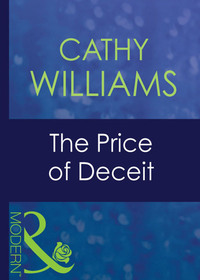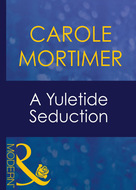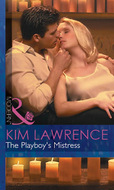Kitap dosya olarak indirilemez ancak uygulamamız üzerinden veya online olarak web sitemizden okunabilir.
Kitabı oku: «The Price Of Deceit», sayfa 2
‘In a way, I’m glad I met you,’ he said, standing up, and there was a stillness about his movements that was as alarming as the black fury on his face had been earlier on. ‘I’ve learnt a valuable lesson from you. Deception isn’t always obvious.’
Katherine scrambled to her feet, and when she met his eyes she saw the scathing dislike there.
Now there was nothing left to say. She had done what she had to do, but, as things had turned out, she had achieved it in the worst possible way.
‘Here,’ she said, handing him the box. ‘Take it. Please.’
He reached out, and for a second his fingers brushed against hers. How painful to think that this, the last time he touched her, it would be with hatred and bitter disillusionment.
His fingers closed around the box and he flung it into the water. There was cold satisfaction on his lips when he looked at her.
‘Some things are better buried, don’t you think?’
Then he turned and walked away. She followed him with her eyes all the way until he disappeared from sight, then she sat back down and stared at the pond. All her dreams were lying there at the bottom. The ring that would never be hers, and, the love which she had been compelled to reject.
She only stirred when it began to get chilly and the park started emptying of people.
Then she made her way back to Emma’s flat, packed her suitcase, left a note and headed for the station. She would call her friend in the morning and explain what had happened, but omitting the details.
Better this way, she kept telling herself. In many ways, better for him. She kept thinking that all the way back to her home town.
Better for him to leave her with an anger he could understand. Nebulous reasons, however true they were for her, would have not been a clean break for him. How would he ever have understood that she wasn’t the woman he thought she was? Would he have accepted it as easily as the thought of another man?
Her house was waiting there for her, patient and faithful. Katherine stood on the path up to the front door and sighed.
I did what I did for myself to start with, she said silently in her head, shutting her eyes. But in the end I did what I did for you.
How could you have coped with the truth? How could you have coped with the fact that I’m dying? Would you have felt betrayed or would you have felt obliged to stay with me through pity? Wouldn’t either have been more destructive than the way I took?
She opened her eyes, raised her hand and, without thinking about it, coiled her hair into a ponytail, then went inside.
CHAPTER TWO
KATHERINE looked around her at the roomful of bright, young faces. Outside, the warm sunshine spilled over the green playing-fields, poured through the open windows and generally helped to propagate the illusion that maybe, this year, winter would hibernate to another country.
September was always lovely. New term, a few new faces, back to work after the long summer holidays. Every year the holidays loomed in front of her, waiting to be filled, threatening to depress if they weren’t, and she was always glad to get back. Back to the sanctuary of her teaching. Away from thoughts of events that had happened six long years ago. Six years! So long ago that she was vaguely ashamed that the memory of them could still plague her with such force, especially when time hung heavy on her hands and there were no demands of work to keep her mind in its harness.
There were two new girls. Victoria, who seemed to have settled in already in the space of a few hours, helped by the fact that she already knew some of the children in the class, and Claire, small, dark-haired, with far too grave an expression on her face for a child of barely five.
Katherine introduced them both to the rest of the class, all girls, and briefly contemplated the dark-haired addition. She would have to take this one under her wing. She could spot at a glance those little pupils who would need over and above the average attention. Usually they were the quiet ones who, left on their own, would easily retreat into their natural shyness.
This little one, she thought, was far too serious, anxious, even, and quite handicapped by the fact that her first language was French, so much of the good-natured chattering of the rest of the girls was literally incomprehensible to her.
The good thing was that the girl would, at least, be at the start of the learning curve, only slightly behind the other girls who were largely au fait with simple reading. She smiled, touched the neat little bun pinned at the back of her neck, and began class.
‘What do you know about her?’ Katherine asked a week later, when she was in the staff-room with Jane Ray, the head of the preparatory school.
Jane Ray was a small, capable woman with short dark hair and darting black eyes, largely hidden behind a pair of spectacles. Katherine found it very easy to talk to her. She and the other teachers appreciated the way they were generally left to their own devices, free to implement their teaching in whatever imaginative methods they found the best.
‘Not a great deal,’ Jane admitted. ‘She came to the open day at Easter, quite desperate for a place here because of a company move of some kind or another, but I couldn’t extract very much background information. She was being dragged from room to room by a young woman, her nanny in France, I gathered, who either didn’t speak any English or, from the looks of it, had decided to conceal the fact that she did. Lived in France all her life, somewhere near Paris, I gather. Never been to school before. Why?’
Katherine shrugged, frowning. ‘She looks as though she’s carrying the weight of the world on her shoulders.’
‘You shouldn’t worry overmuch about that,’ Jane laughed, but her dark eyes rested on Katherine thoughtfully. ‘Children adapt far more easily than adults expect. By next week Claire Laudette will be well on her way to settling in. Even the language barrier will cease to be a problem. Have you ever noticed how children communicate? It’s all hands and expression at that age!’ They laughed, and Jane continued seriously, ‘Your problem will be that you’ll leave this school in the afternoon and you’ll take your worries about Claire home with you, and you mustn’t do that.’
‘I shan’t!’ Katherine protested. ‘I don’t!’
‘I’ll speak honestly, Katherine. I worry about you sometimes.’
There was a little silence. Katherine dreaded it when people decided to speak honestly to her. She knew how her life must appear to outsiders. Calm, placid, a lovely job, but lacking in excitement.
‘Do you mean that I’m not doing my job properly?’ she asked, deliberately misreading the statement, and Jane shook her head.
‘Oh, no, we were delighted when you reapplied for your job here after your six months away. You’re an extremely good teacher. You stimulate the children, get them interested in the basics—no, I can’t fault that.’ She sighed. ‘You know what I mean, don’t you?’
‘I’m happy.’ Katherine looked down at her fingers. Yes, I am happy, she told herself. I have a roof over my head, a job I enjoy, friends—what else could I ask for? In her more optimistic moments, she even tried to convince herself that in time she would be able to put that disastrous episode behind her. It couldn’t haunt her for the rest of her life, could it?
She should, she knew, be grateful that she had been given this second chance at life. She could still remember the private anguish of thinking that she was living on borrowed time, just as clearly as she could remember her dizzy, weak euphoria when she had returned to her cottage all that time ago and found that letter on her doormat, sandwiched between the usual circulars and out-of-date bills. The letter that had informed her politely about the confusion with her notes, apologised courteously for an error of mistaken identity, informed her gaily that she was perfectly healthy. Too late for her, of course, but, yes, she had told herself, I am grateful and I am happy, and she had continued telling herself that as time passed.
‘Perhaps I’ll give little Claire a bit of private tuition. Just a few minutes after class. She isn’t collected until four.’
‘I’m sure that would be very helpful,’ Jane said with a resigned smile, ‘but you mustn’t forget that you have a life of your own to live.’
Have I? Katherine would have liked to ask. Living, she thought, truly living, was something that entailed joy and despair, hopes and dreams and all the ups and downs that gave life its pleasing tempo.
Her life, when she thought about it, was like the flat, undisturbed, glassy surface of a pond. She was content, but she knew that contentment was not what Jane was talking about.
‘I won’t,’ she said dutifully, and that was the end of that. She had become adept at skirting around the details of her private life. She went to the movies, had meals out with her small circle of friends, read a lot, busied herself with her work, but her feelings and emotions she kept to herself.
It was as if, she frequently thought, those heady six months had never really existed. She could hardly believe that she had ever stretched her wings like that and flown free, although she remembered the pain of the landing as bitterly and as clearly as if it had all happened yesterday, and not six long years ago.
She was now no longer a girl. That was something she faced without flinching. She was in her thirties, almost thirty-two, and destined, she knew, to be on her own forever more. That was something she didn’t like to think about too hard. Forever. What a lonely ring that had to it.
The following day she began spending time after school with Claire. In the past week she had discovered that the child’s reserve had nothing to do with her intelligence. Claire Laudette was extremely bright.
They sat side by side in the empty classroom, and it was only when an elderly lady came in that Katherine realised that the few minutes which she had allocated to helping with reading had stretched into a full hour.
I won’t make this a habit, she told herself that evening. I’ll do as much as I can during the school day and then, occasionally, I’ll stay after class until her English has improved.
But there was something curiously vulnerable about the girl, and it touched something equally vulnerable in Katherine.
Little by little, over a period of a few weeks, she also began learning snippets of information about Claire’s home life and, much as she disliked her curiosity, she found herself becoming more and more interested in Claire Laudette as a little person, as opposed to Claire Laudette as a pupil and nothing more.
‘I have no mother and Papa is never at home,’ she would say, apropos nothing in particular. ‘We do not have any pets. He does not allow animals.’ This didn’t seem to bother her in the slightest, but it bothered Katherine.
‘He does not like me to trouble him,’ she would say casually, or, ‘Papa does not have much time for me,’ and the picture that began building in Katherine’s head was so alarming that she began to think about arranging to see him one evening.
She knew all about the damage an uncaring parent could do to a child. Hadn’t she suffered the slings of that when she was young?
‘What about the lady who comes to collect you from school?’ Katherine asked gently. ‘She looks very nice. Is she your aunt, perhaps?’
‘Papa pays her.’ Claire was busy colouring a picture she had drawn, a crooked house with lop-sided windows and disproportionately large flowers huddled on one side. ‘He says that money can buy anything.’
Katherine sent the note home with the child that evening. It was short and to the point. She wanted to see Claire’s father and, rather than leave it to him to arrange a time, she suggested one. That way, he would have to make an effort to cancel the time she suggested or else he would come along. She hadn’t yet worked out what she intended to say to this man, but she would let her intuition guide her. She could usually tell a great deal about the parents from the children, anyway.
The aggressive ones, who were prone to bullying if allowed to get away with it, tended to have socially aggressive parents, mothers who spent a fortune on their clothes and managed to persuade their little angels, without actually saying so in so many words, that they were superior to everyone else.
From what she had seen of Clair Laudette, and from what she had gleaned, she had already formed a very clear impression of her father. A strident man, too selfish to care about his offspring, driven by a need to stack up piles of money, who probably drank. She could imagine him storming through the house, his face ill-tempered, while his daughter cowered away somewhere in a bedroom. A child who seldom laughed, she thought, thinking back to her own silent childhood, rarely had anything to laugh about.
She had arranged to see him that evening at six at the school, and she had persuaded Jane to let her use her office for the meeting.
‘I shall be seeing your daddy this evening,’ she told Claire as the child was getting ready to leave, and the worried look, which had been absent for a while, settled on her face.
‘Why?’ she asked anxiously, chewing on her bottom lip and frowning. ‘You won’t say anything bad about me, will you?’ she asked with a tremor in her voice, and Katherine said huskily,
‘Of course not!’ She gave a bright smile. ‘A bright little thing like you? No, I just want to tell him how wonderfully you’re getting along. I’m sure he wants to know.’
In fact, she had dressed specially for the purpose of telling him just how well his daughter was doing, and dropping a few hints about the importance of parental support in a child’s life.
Warm though it was, she had worn her navy blue suit with a crisp white shirt underneath, and she would make sure that her long hair was pinned very tightly back from her face, no loose strands anywhere.
In six years she had let her hair grow, and it now reached almost to her waist. Soon she would have to have it cut. Long hair at her age was a bit inappropriate, but she didn’t look like a woman in her early thirties. She knew that. She might be plain, but her face was unlined and her grey eyes were clear. Her friends had stopped telling her that the lines would develop quickly enough, just as soon as she had a couple of children. Marriage and children were subjects which they tactfully avoided now that it looked as though neither was on the horizon.
At five to six she began wondering whether she should meander out to the entrance to wait for him. At five past six she decided not to, and at ten past, when she was beginning to wonder whether he would make an appearance at all, she looked up and saw him standing in front of her, his body outlined in the doorway of the office.
And he was precisely as she remembered him. He was even holding his jacket over his shoulder, exactly as he had done all those years ago as he had walked across to her in Regent’s Park.
She opened her mouth in shock and half rose out of the chair, feeling as though at any minute she would faint. The room felt close, as though there wasn’t enough air in it, making her dizzy, disorientated. She had to place her palms on the desk to support herself.
‘You!’ It was the only form of greeting she was capable of. If he was as shocked as she was, then he recovered quickly, moving towards her with the same graceful, economic stride she remembered.
‘Katherine Lewis,’ he said without smiling. His eyes were hard and shuttered.
‘I had no idea that you were Claire’s father,’ she said, finding her voice at last, and not managing to say what she wanted.
‘Nor,’ he said coolly, ‘did I think for a minute that the Miss Lewis whom my daughter talks about incessantly was none other than you.’ He paused, and his eyes raked her up and down with dislike. ‘What an unpleasant surprise for both of us.’
The memories of him were rushing over her, but that dislike in his eyes restored some of her balance, and she sat down again, indicating to him the chair facing her across the desk.
She could feel her heart beating wildly in her chest, like a trapped, fluttering bird wanting escape.
She had collected some of Claire’s work. It lay in front of her in a neat little pile and she rested her hand on it, hoping that it would remind her what the purpose of this meeting was, but she could feel Dominic’s hard eyes straying over her, and she didn’t have to try too hard to imagine what he was thinking.
Was this the same girl he had known all those years ago? This ageing woman with the neatly pinned hair and the severe suit? She felt momentarily unbalanced by the inspection and had to remind herself that this was one of the reasons why she had walked out on him in the first place. Because this was her, the last sort of person he would find attractive. More the sort of woman he would probably pity.
‘Unpleasant or not, the fact stands that I am Claire’s teacher—’ she cleared her throat ‘—and I called you in to see me so that we could discuss what your daughter has been doing.’
She had never really imagined that he would marry. In her mind, he had remained the startlingly attractive bachelor whom she had known, but, really, it would have been unusual if he hadn’t married.
Had he loved his wife? she wondered. What had happened to her? Were they divorced?
‘I have some of Claire’s work here,’ she said, staring down at the little bundle of papers with their childish drawings and round, uneven writing.
‘You’ve changed.’
‘Everyone changes,’ Katherine said sharply, but his words flustered her badly. ‘It’s the effect of time.’
‘So you’re now a teacher, of all things.’
‘That’s right. Now, shall we discuss your daughter or would you like to spend a bit more time denigrating me? I’m a busy woman, Mr Duvall.’
‘Are you? Busy doing what? No wedding-ring on your finger, so I take it that you’re not married?’
She was feeling more and more addled, like a mouse being toyed with by a cat, confusedly running round and round, looking for somewhere to hide.
‘I’ve got some things that your daughter has done.’ She handed the stack of work to him and he took it, flicking through the papers, holding them in different directions so that he could interpret the drawings. Katherine watched his lowered head and thought that, if she had changed, he certainly hadn’t. It hardly seemed fair that six years could have had so little physical impact on him. His dark looks were just as disturbing as they had been, his body still as lithe and hard. Her eyes strayed to his fingers—long, clever fingers. She briefly closed her eyes and tried not to think back to the feel of those fingers on her body.
He had taken her body once, and he had kept it. She had known no other lover but him, although there were men in her life now. Friends. Harmless, good-natured men, who were husbands of her friends, and David, another schoolteacher, though not at her school. David was harmless and good-natured too and, given half a chance, he would have progressed their friendship on to a far more intimate level. But ever since Dominic… It wasn’t fair, she thought with a burst of angry rebellion. His life had moved on—he had married, produced a beautiful child. Emotionally, and this was the first time she had acknowledged this to herself, her life had stagnated, like a clock that had stopped ticking.
He was looking at her, his eyes guarded, watchful, and she forced herself to resume her efficient, businesslike air.
‘What am I supposed to say about these?’ he asked, depositing the stack of papers on the desk and reclining in the chair.
‘Most parents express delight at their children’s efforts,’ Katherine informed him, keeping her voice even. ‘Workwise, Claire has settled very nicely into class. Was she at school before you came here?’
‘No.’ His voice did not encourage interested debate on the subject.
‘I see. She seems to have a very good grasp of English, in that case. Her knowledge of the alphabet is excellent, and she is quite a fluent reader, considering.’
‘Considering what?’
‘Considering,’ she said, with two angry patches of colour on her cheeks, ‘that this is her first brush with school.’
‘Her mother was bilingual.’ His voice was flat and expressionless and gave no insight into what he thought of this bilingual woman.
‘I see.’ She paused, alarmed by his hostility, and nervously touched the tightly coiled bun at the back of her neck. ‘I do feel, however,’ she continued, ‘that children, especially at Claire’s age, need a great deal of parental input. I gather that your wife is not here at the moment?’
‘And from whom have you gleaned that piece of information?’ he asked coldly. ‘I hope you haven’t been quizzing my daughter on her private life, because I can’t say that I see what Claire’s home life has to do with her work, and you tell me that her work is entirely satisfactory.’
‘This is a school, Mr Duvall,’ Katherine informed him with equal coolness. ‘We do not make it a habit to interrogate our pupils. However, what happens in a child’s home has a great deal of bearing on what happens in school. Claire is very reserved, very anxious.’
‘And you’re somehow blaming me for that?’ He shot her a look of scathing dislike.
‘I’m not blaming you for anything,’ she responded acidly. She had never before dealt with a difficult parent. In general, parents who paid for their children’s education took an inordinate delight in their progress. At parent-teacher evenings, they would hang on to her every word.
Dominic Duvall could not have been more unhelpful if he’d tried, and she knew that personal dislike of her would be playing a part in that, though to what extent she had no idea.
‘Let’s get one thing very clear from now,’ he said, leaning forward slightly, and his presence was so overwhelming that she felt herself press back into her chair. ‘Neither you nor anyone else has any business prying into my personal life. Your job here is to educate my daughter, and that’s where your duty ends.’
‘And the fact that we once knew each other has no bearing on what you’re saying now?’ Katherine asked, stirred into making the remark through sheer anger at his attitude. ‘Please don’t let your dislike for me colour your reactions to what I’ve been telling you.’
‘Spare me your schoolmistress speech,’ he snarled, his mouth tight. ‘What happened between us is in the past. If I hadn’t decided to send my daughter to this school, we would never have crossed paths again. The fact that we have, my dear Miss Lewis, is unfortunate, but it’s something we both have to live with. In the meantime, please do not interest yourself in my daughter’s home life.’ He stood up. The meeting, as far as he was concerned, was at an end, and Katherine hastily followed suit, crossly knowing that control had been taken out of her hands.
They went out into the assembly-room, where a group of older children were doing ballet. The piano teacher was banging impatiently on the keys while a handful of girls frowningly concentrated on trying to get their feet into some kind of synchronisation.
Dominic stopped and looked around him with interest, then his eyes flicked across to her.
‘What made you decide to give up your job in advertising?’ he asked, sticking his hands in his pockets and moving on, expecting her to hurry behind him but, she gathered from his attitude, not much caring whether she did or didn’t.
She had to think a bit about what he had said, then she remembered that a job in advertising had all been part of the myth which she had created for herself during those short, heady months of another life.
‘I enjoy teaching,’ she answered awkwardly. ‘And what have you been doing for the past six years?’
They went out into the hall, where some more girls were sitting on the ground, cross-legged, waiting to be collected. Behind them, the wall was one large notice-board—listing school events, displaying paintings done by some of the pupils.
Judith Evans, one of the teachers, was sitting by the doors, trying to keep one eye on the girls while correcting homework. She looked at Katherine, then slid her eyes across to Dominic with great interest.
‘Working,’ he said smoothly, opening the door and stepping outside.
Katherine hesitated, then she stepped out behind him, letting the door shut behind her.
‘Claire mentions that she doesn’t see a great deal of you,’ she began, and he turned on her, his green eyes filled with distaste.
‘I thought that we’d been through all this,’ he said in a hard voice, and Katherine stuck her chin out defensively.
‘You’ve been through all this, Mr Duvall. However, just because you’ve decided on what’s important in Claire’s life and what isn’t, it doesn’t mean that I have agreed.’
He looked her up and down unhurriedly, then said, ‘And you are the final word on what’s best for a child, are you? Tell me, have you any children of your own?’
‘No,’ she admitted in a low voice, lowering her eyes. ‘But I really don’t see what that has to do with it. I have a great deal of experience with children in general.’
‘No children,’ he mused, with enough thick irony in his voice to make her flush with anger. ‘No husband. What happened to the misguided lover?’
She didn’t have to think too hard about that one. She remembered the fictitious lover whom she had hurled at Dominic when he had demanded a reason from her, a reason for leaving.
‘That’s none of your business,’ she muttered, looking away and staring at the playing-fields, where more girls were playing hockey in the distance.
It had never struck her before, but now she thought, how strange, to surround myself with children, children who represent everything that I no longer have—hopes, dreams, a life ahead to be filled with everything I shall never be able to attain.
Would Dominic Duvall ever know just how successfully he had wrecked her life? She would never forgive him for that, even though she knew that the fault for it all lay in her own hands, because she should never have become involved with him in the first place. Not in the way that she had, not fuelled by motives which had seemed so right at the time, but in the end had proved so misguided.
‘Did the grand reconciliation never take place?’ he asked, sarcastic and amused, which made her even angrier. ‘Poor little Katherine Lewis. Or maybe you’re one of those ever-hopeful women, still walking along the garden path, optimistically thinking that she’ll get her man in the end, if only she can hold out for long enough.’ He laughed under his breath, a cruel, jeering sound. ‘Is he still holding out the promises he made to get you back?’ he asked, looking down at her with a smile that was as hard as ice.
‘This is irrelevant,’ Katherine said, trying to sound brisk and instead only managing to sound defensive.
‘Oh, but I’m merely trying to piece you together. Natural human curiosity. You asked me about what I’d been doing over the past six years. Well, I’m merely speculating on what you’ve been doing.’
‘I must get back to the school,’ she said, turning away, but before she could walk off she felt his fingers snap around her arm.
‘What for?’ he asked, raising his eyebrows. ‘To tidy desks?’
‘You may think that what I do is boring,’ she snapped, ‘but teaching is as essential as what you do. A person’s usefulness in life isn’t judged by the amount of money they earn. And kindly remove your hand from me.’
He removed his hand and she drew back, aware with horror that she was shaking like a leaf.
‘Dear me,’ he said, coolly amused, ‘I do hope my questions haven’t upset you.’
‘You hope nothing of the sort, Mr Duvall. And, no, your questions haven’t upset me. They’ve annoyed me.’
She fervently wished that that were the case, but she knew that she was deeply unbalanced by this sudden appearance in her life of the one man whose image she had spent years trying to erase.
‘Do you normally tremble when you’re annoyed?’ he asked, politely curious.
‘No,’ she answered icily, ‘I don’t. Perhaps it’s just that you were the last person in the world I expected or wanted to confront. No one likes to be reminded of past mistakes, do they?’
His lips thinned and she had to steel herself not to take a step backwards. Had she forgotten how threatening he could be? His green eyes could assume the wintry, terrifying depths of the ocean, and that leashed power which always hovered so close to the surface reminded her that he was not a man to be crossed.
‘Least of all when they’ve learnt nothing from them,’ he countered with dangerous calm. ‘Did your lover hold out promises to you on condition that you buried yourself here, teaching? Tell me, what makes a woman give up a life of excitement in exchange for the sedate, the unthreatening?’
Of course, she had always suspected that her real life would arouse only his contempt, but hearing him say so made her stiffen.
‘Is he worth it? You must introduce me to him.’
‘I happen to like it here,’ she said evenly. ‘And since you feel so free to ask me questions about my private life, you won’t mind if I ask you a few about your own? How long did you wait after we broke up before you married?’
‘Would you like to hear that I gave our dead relationship a suitable period of mourning?’ He laughed aloud at that. ‘I met Fran ise six weeks after I left London and I married her two months later. Disappointed?’
ise six weeks after I left London and I married her two months later. Disappointed?’
‘What happened to her?’
There was a thick silence, which only lasted seconds but was long enough for her to wonder whether anger had pushed her into asking something which really was none of her business. She wished that she had not asked; she wished that she had simply walked off. The last thing she wanted to do was reveal to him the depth of her interest in his life, reawakened after so long a slumber.
Ücretsiz ön izlemeyi tamamladınız.








